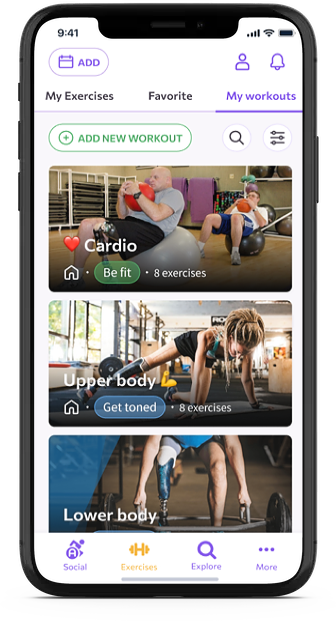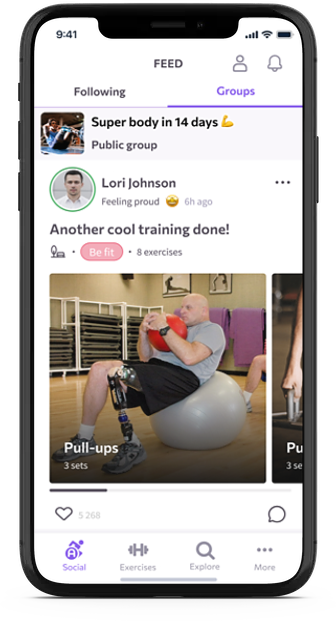Ali Jawad is a British Paralympic Powerlifting Champion who believes that sport should be seen as something for everyone, regardless of whether they have a disability or not.
Jawad’s belief is why he teamed up with his former agent and fellow British athlete Sam Brearley to start Accessercise, a fitness app for people with disabilities who want to exercise. The startup was named to TechCrunch Disrupt 2023’s Startup Battlefield 200 group.
In the first onboarding step, Accessercise asks users about any disabilities they may have, such as missing upper or lower limbs. The next questions ask about their current level of mobility and whether they need assistance from anyone.
 Image credit: Accessercise
Image credit: Accessercise
The onboarding process is key to what happens next: At Accessercise, each disability is supported individually.
“People with one leg will only see videos that are scientifically valid, relevant, safe and proven to be helpful to them, and the videos are demonstrated by people with one leg,” Brearley told me. “This is really important to ensure that it’s not only relatable, but that our support is very tangible.” [of] Each has different obstacles.”
Focus on Empowerment
Because Accessercise is focused on empowerment, it doesn’t come with pre-made routines. Instead, users can create their own training plans by choosing from existing videos, Brearey says. “You can build your own workouts and create your own schedule.” [in] You can set reminders on your calendar, filter exercises based on where you want to train, the muscle groups you want to train, difficulty level and the equipment you have available.”
To help users continue their training, Accessercise also includes social features such as sharing comments, likes and groups, which can be based on specific obstacles or training goals, as well as geography.
 Image credit: Accessercise
Image credit: Accessercise
Geolocation is also part of the “Explore” section, which Brearley describes as Accessercise’s third main feature. Currently, it features a map of UK fitness facilities and basic information about their accessibility levels, but the startup plans to add more detail over time and also use it to encourage more gyms to take special needs into account.
According to a recent white paper from the Perkins School for the Blind, an estimated 1.3 billion to 1.85 billion people worldwide live with at least one disability. There are many barriers to exercise, but lack of willpower is rarely one of them.
“We know that the majority of the disability community wants to be more active: 81% [do] “And we know that disabled people are twice as likely to take up the opportunity when given it. The only thing missing was someone willing to give them the resources, the knowledge and the authority, and that’s exactly what we did,” Brearley said.
A lack of adaptive training advice remains an issue, which is why the startup has partnered with fitness education company Future Fit to help coaches get certified to work with people with disabilities, which is why Accessercise’s videos are original content: there’s just no substitute for scientifically validated training.
A disability tech startup killed the skeptic in me
“For example, with COVID, if you’re healthy and want to stay fit during lockdown, you can go onto YouTube and type in ‘Joe Wicks’ or ‘push ups’ or ‘workout’ and you’ll have hundreds of thousands of options. But if you go onto YouTube and type in ‘one-legged push ups’ you’ll get at most 10 videos and nine of those are filmed by people who aren’t qualified,” Brearley said.
The pandemic played a big role in Accessercise’s original story: At the time, Jawad was preparing for the Tokyo Paralympics, which were postponed for a year, and began looking for ways to help the disability community become more physically active. This also struck a chord with Brearley: a retired professional sailor turned sports agent, Brearley specializes in underrepresented sports and includes several Paralympians among his clients.
To develop the app, Brearley tapped into his connections in Ukraine, where he has lived for five years and where Accessercise’s third co-founder is from. Yulia Kirpa, a lawyer, left her job due to “significant strategic differences regarding the running of the company,” he said. Brearley, meanwhile, said Ukraine was a very important part of his life, even though he fled when the war escalated. Similarly, Accessercise outsources all of its marketing and development to Ukrainians.
Accessorize on a global stage
Offering content for free to Ukrainians is part of Accessercise’s plans, but the company’s commercial expansion goals are broader and more immediate: It is targeting Brazil and English-speaking countries outside the UK, including the US, later this year.
Brearley himself plans to emigrate to the United States and relocate his company there. Accesscise also recently announced that it is closing its “first institutional funding round.” The company has already received funding from the Cerebral Palsy Alliance Research Foundation of Australia (CPARF) for the second half of 2022.
More funding would help Accessercise expand globally and develop the app sections it currently has and is coming soon: nutrition, shop, blog and podcast. The startup hopes to launch all of this in the coming months to diversify its revenue streams, Brearey said. Besides e-commerce revenue from a shop selling adaptive training items, the company also plans to make money through advertising and targeted sponsorships.
Besides expansions and new features, Accessercise plans to use the upcoming funding for “significant marketing efforts” to expand its organically acquired user base. With around 2,100 active users before Disrupt, there’s still a lot of room to grow given that its target demographic is underserved.
The app uses a freemium model, with subscription costs £11.99 ($14.61) per month, dropping to £5.41 ($6.64) per month for a 12-month plan.
This article was updated on January 30, 2024 to correct a statement about Accessercise’s third co-founder.

